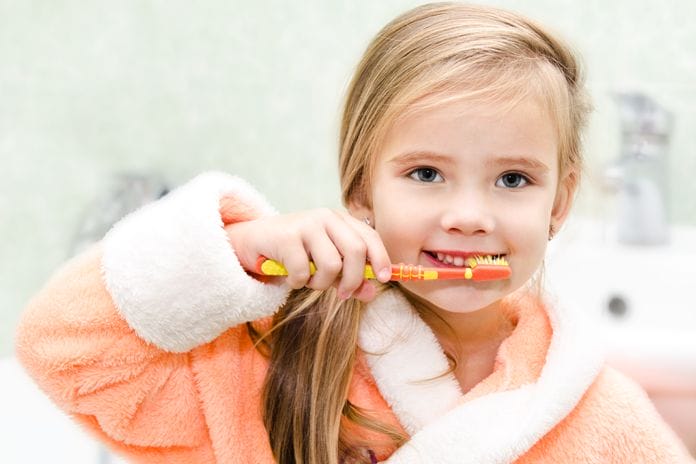Disclosure: We value transparency at Today’s RDH. This article is sponsored content from Crest/Oral-B as part of our sponsored partner program.
Children, precious, innocent, at times a little difficult! Any parent or grandparent understands the amount of work it takes to raise a child. Children need and deserve our complete attention, direction and guidance to succeed in every way. We all want our children to become independent, successful adults. Most of all, I believe that as parents, we have a duty to fulfill. A duty to provide them with the knowledge and power to make good decisions for themselves and future generations. To be an example of respect, compassion, empathy and kindness, and to arm them with knowledge and power for health and longevity.
We have become a country of overconsumption, in every way. With food, gadgets, games and phones. We are a nation of convenience. Convenience foods are number one. Those foods, both processed, packaged and fast foods are devoid of nutrients, fiber, full of trans-fat and sugar, and especially high in added fructose. This, in part, is leading to obesity related diseases of epidemic proportions in both children and adults. Evidence states that fructose causes severe metabolic dysfunction because it is directly stored as fat, unlike any other sugar. Obesity and a poor-quality diet predispose us to all major chronic diseases.[1] Diabetes, high cholesterol, high blood pressure, cancer, non-alcoholic fatty liver disease, tooth decay and periodontal disease. To lower your family’s risk of obesity and tooth decay, the World Health Organization (WHO) recommends reducing sugar consumption, by limiting added sugar to 10 percent of daily calories or less. To prevent chronic diseases, the WHO suggests limiting your sugar consumption to a maximum of 5 percent of your daily calories.[2] (9 teaspoons for men, 6 for women, 3-4 for preschool & elementary children and 5-8 teaspoons for teens and tweens.[3]) As for the oral cavity, an overconsumption of sugar can change the calcium to phosphorus ratio of teeth and bones, weakening both. Most importantly, a diet of nutrient-dense foods makes teeth stronger and healthier, in turn, preventing decay and disease.[4] Nutrition has always been known to have etiological origins of a healthy oral cavity. Poor diet can lead to a higher incidence of caries as children and later in life as adults.
What can we do to prevent chronic illness and oral diseases? For one, by taking the time in our busy lives to prepare and plan nutritious meals and snacks. It can be done. Make the impossible possible. A great place to start is by restructuring your family’s relationship with food. This includes limiting or eliminating sugar-sweetened beverages, such as, soda, juices and energy drinks. Have them with a meal if need be and do not sip them all day long. If your family has desserts, eat them after a meal and limit in between snacking from packaged foods like fermentable carbohydrates (chips, pretzels, crackers). This includes sugary snacks and candies as well. The more you limit, the less they will crave! Better yet, alter your home environment, exclude these types of processed foods from your home. If you don’t buy them, no one can eat them. Then, add more whole foods. Introduce your family to more fruits, vegetables, both cooked and raw, and have them readily available. This is not new information, we all know what we should be doing, what we should be eating, it’s a matter of, “doing it “and making it sustainable. Yes, you will hear complaining, but in the long run, it will be better for you and your family in both oral and overall health. Besides, after initial complaints, everyone will develop a new sense of taste. Our taste buds regenerate every ten days. Everyone will have a new appreciation for whole foods. Cravings will subside, health will prevail! The risk of systemic disease will drop and cavities will dwindle.
Where does a parent begin in these days of mass marketing? Our children are little sponges that absorb all the advertising and marketing of snack foods, candies and cereals with their favorite characters. The best place to start? YOU! You are the biggest example, the leader of your children’s dental health habits and nutrition. If you have a diet of fast food and processed food, your children will have a diet of the same. If you don’t brush your teeth, your children won’t brush their teeth. If you don’t floss, your children will not floss. Lead by example!
42% of children, ages 2 to 11 have dental caries in their primary teeth and 23% of children the same age have untreated dental caries.[5] As parents, we must provide optimal oral health at an early age to develop healthy oral hygiene habits that will last a lifetime. You will want to begin cleaning and massaging their gums in infancy with a washcloth or with an infant gum massager, and moving on to a soft toothbrush as their teeth begin to erupt, at about 4-6 months of age. As children become toddlers, it is important to let them brush the best that they can and then you take over for them by standing behind them and brushing their teeth as you would your own. You can support the back of their head with your torso if sitting, or your leg by standing and using your non-dominant hand at the chin. This is an ideal position and not as awkward as brushing from the front. Have your child facing the mirror so that they can see and mimic what you are doing.
As you all know, primary teeth eventually do fall out, but they are an important part of your child’s nutrition with chewing, speaking and adult tooth development. As children grow, if they have not developed good oral hygiene habits, it can be a never-ending struggle to get them to brush at least twice a day. As a hygienist, I prefer my patients to brush three times a day at minimum. Not necessarily breakfast, lunch and dinner either. Anytime is fine. Making it fun is part of the secret to success. Have patience, let them play in the water if they want to, never say “No” if they ask to brush, and allow them time with you to brush together. Sometimes developing good habits must be on their terms and at their convenience rather than yours. Make buying them a new toothbrush fun! Let them pick out from a selection you have made that are age and size appropriate. These methods have worked extremely well for my 2-and-a-half-year-old niece, who cannot walk past my bathroom without asking to brush her teeth. No matter what I am doing, I always say,” Yes”, even if I am in a rush, as usual. It is independence and choice. She now takes responsibility for her own brushing.
In addition to frequency of brushing it is vitally important to brush for a minimum of two minutes each time children brush. Since compliance is always an issue, we must find ways for children as young as my niece to take responsibility without it being a chore and without parents nagging. They will be more resistant of your initiation. Let your child’s hygienist and dentist know if you are experiencing compliance issues. Sometimes instructions from someone other than a parent work best. I always pull the Tooth Fairy into the equation with young patients that are non-compliant. I explain that she does not pay for dirty teeth and that the Tooth Fairy knows if you brushed the tooth after it has come out of the mouth. She checks up on her future collection of teeth regularly while kids are sleeping.
An hourglass timer was working at times, for the two-minute length of time needed to brush effectively and thoroughly for my niece and my young patients, until I learned about the Disney Magic Timer app from Crest/Oral-B. This app is so cute and fun, compliance becomes a non-issue. It motivates kids to brush for two minutes at a time as needed for a healthy oral cavity and reduced risk of caries. Children are incredibly tech savvy today and this app allows your child to pick their favorite characters from Disney, Marvel and Star Wars, making it customizable for them personally. You just download it from any smart device for two minutes of brushing fun!! Best of all, it is free. Check it out in your app store and let the non-hassle of two-minute brushing fun begin! Happy habit hygiene at its best with the Disney Magic Timer app from Crest/Oral-B!
References
- http://jamanetwork.com/journals/jama/article-abstract/2512347?resultClick=1
- http://www.reuters.com/article/us-health-who-sugar-idUSKBN0M01IU20150304
- http://healthyeating.sfgate.com/maximum-amount-sugar-day-children-8982.html
- https://wellnessmama.com/17088/brushing-teeth-prevent-cavities/
- https://www.nidcr.nih.gov/DataStatistics/FindDataByTopic/DentalCaries/DentalCariesChildren2to11.htm











